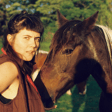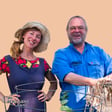
It's the little things with Kat Lavers
After countless requests I present to you: Kat Lavers 🐈⬛
Wicking buckets, magic bug buttons, interspecies adventures, listener questions and more!
Kat and I recorded this convo at her kitchen table, surrounded by ferments and preserves and garlands of dried chilli.
At just 1/14th of an acre, Kat's urban homestead The Plummery has been known to pump out 428kg of fresh produce in any given year, meeting almost all the fruit/veggie requirements for two people. I M P R E S S I V E S T U F F.
Kat is a beloved permaculture educator, passionate gardener, and sustainable food system furtherer whose compassion for all living things could fill five football stadiums, whilst also being the poster child for small wonders.
You may have seen Kat featured on Gardening Australia, Happen Films, myriad permie/green media channels, and in this one-and-a-bit hour yarn we plumb the depths of her mind, heart and utterly delightful psyche through her list of 10 things.
LINKY POOS
Kat on Instagram (which she doesn’t really use)
Wildlife Homestead YouTube Channel
[BOOK] Once ~ Annie Raser-Rowland
Reskillience with Annie Raser-Rowland



















